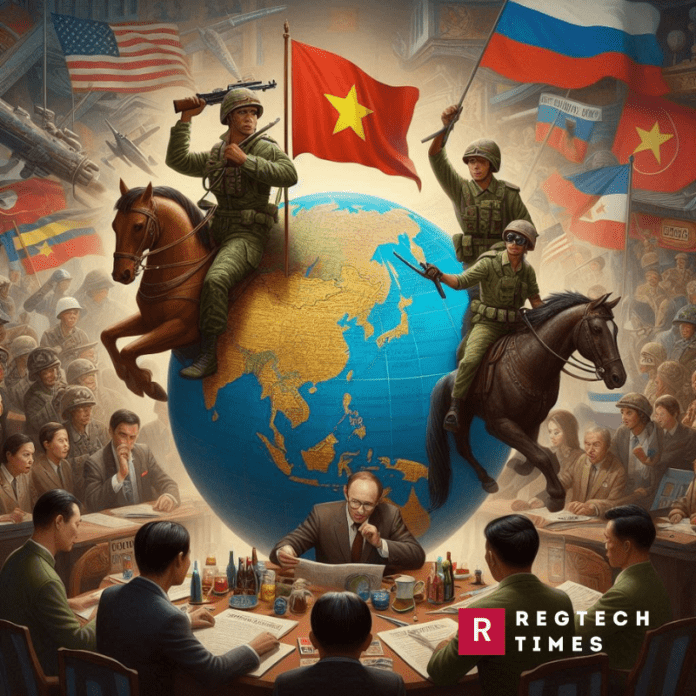Vietnam’s historical relationship with Russia dates back to the Soviet Union era, which has cultivated a deep-rooted bond between the two nations. This relationship was recently underscored by the visit of Russian President Vladimir Putin to Hanoi, a move that attracted considerable attention and criticism, particularly from the United States.
Despite the Western backlash, Vietnam’s invitation to Putin demonstrates its commitment to a foreign policy characterized by independence, self-reliance, diversification, and multilateralism. This diplomatic stance allows Vietnam to maintain and strengthen its long-standing ties with Russia, even as global political dynamics shift and tensions rise.
The Vietnamese government’s willingness to host Putin, who last visited the country in 2017 for the Asia-Pacific Economic Cooperation Summit, highlights its prioritization of strategic alliances over Western opinions.
The United States, in a statement issued by its embassy in Hanoi, strongly criticized Vietnam’s decision, emphasizing that no nation should provide a platform for Putin to propagate his aggressive policies and normalize his controversial actions. However, Vietnam appears resolute in its approach, seeking to balance its relationships with major global powers to safeguard its national interests.
Vietnam’s Collaborations and Energy Projects
Economic collaboration forms a crucial component of the Vietnam-Russia relationship. Russia’s Novatek PJSC has announced plans for liquefied natural gas projects in Vietnam, signaling a deepening of economic ties between the two nations. Additionally, there are initiatives to establish a center for nuclear energy and technologies with the assistance of Russia’s state nuclear corporation, Rosatom.
Vietnam’s Diplomatic Strategy Amidst Shifting Geopolitical Dynamics
These projects underscore the multifaceted nature of the Vietnam-Russia partnership, extending beyond mere political alliances to encompass significant economic and technological cooperation.
Furthermore, Vietnam is exploring avenues for cooperation with Russia in the development of wind power. This aligns with Vietnam’s broader energy strategy and its ambitions to diversify its energy sources.
Tran Qui Thanh: Behind the $40 Million Fraud Case Shaking Vietnam
The economic interactions between the two countries are not limited to energy alone; trade transactions between Vietnam and Russia are predominantly conducted in rubles and Vietnamese dong, bypassing the international payment system SWIFT, from which Russian banks have been excluded due to sanctions. This financial arrangement highlights the adaptive strategies both nations employ to sustain their economic engagements amidst geopolitical constraints.
Breaking Down Vietnam’s Biggest Financial Scandal: The Truong My Lan Trial
Military and Defense Ties
Vietnam has historically relied on Russia for military supplies, including aircraft and submarines, which are pivotal for its defense capabilities. However, the Russian invasion of Ukraine and the ensuing Western sanctions have complicated Vietnam’s procurement of Russian arms. Despite these challenges, the defense relationship between the two nations remains significant.
Vietnam views Russia as a crucial counterbalance to both China and the United States, given its geopolitical situation.
Russia’s support is particularly valuable for Vietnam in the context of its disputes with China over territorial waters. Russian state-owned companies have been instrumental in supporting Vietnam’s sovereignty claims in the South China Sea through oil and gas exploration and drilling operations.
This support often comes in the face of aggressive actions by China, demonstrating Russia’s steadfastness in its strategic support for Vietnam. The backing of Russian firms in these contentious areas provides Vietnam with a buffer against Chinese pressure and enhances its bargaining power in the region.
Diplomatic Balancing Act
Vietnam’s diplomatic stance on the Ukraine conflict is one of neutrality, advocating for peaceful and diplomatic resolutions. This balanced position has been acknowledged and appreciated by Russia, with Putin expressing gratitude for Vietnam’s pragmatic approach. The Vietnamese leadership, despite facing international scrutiny, continues to maintain a delicate balance in its foreign policy, navigating the complexities of its relationships with major global powers.
Vietnam’s decision to host Putin and its ongoing cooperation with Russia can be seen as a strategic maneuver to secure its national interests amidst a turbulent geopolitical landscape.
While the move is fraught with risks, particularly in terms of international perception and potential economic repercussions, Vietnam appears committed to its path of independent foreign policy. This approach allows Vietnam to harness the benefits of its historical ties with Russia while managing its broader international relationships.
In conclusion, Vietnam’s relationship with Russia, exemplified by Putin’s visit, underscores a multifaceted alliance that encompasses historical bonds, economic cooperation, military support, and diplomatic balancing. As global political dynamics evolve, Vietnam’s strategic decisions will continue to shape its role and influence in the region, reflecting its commitment to maintaining sovereignty and fostering diverse international partnerships.


